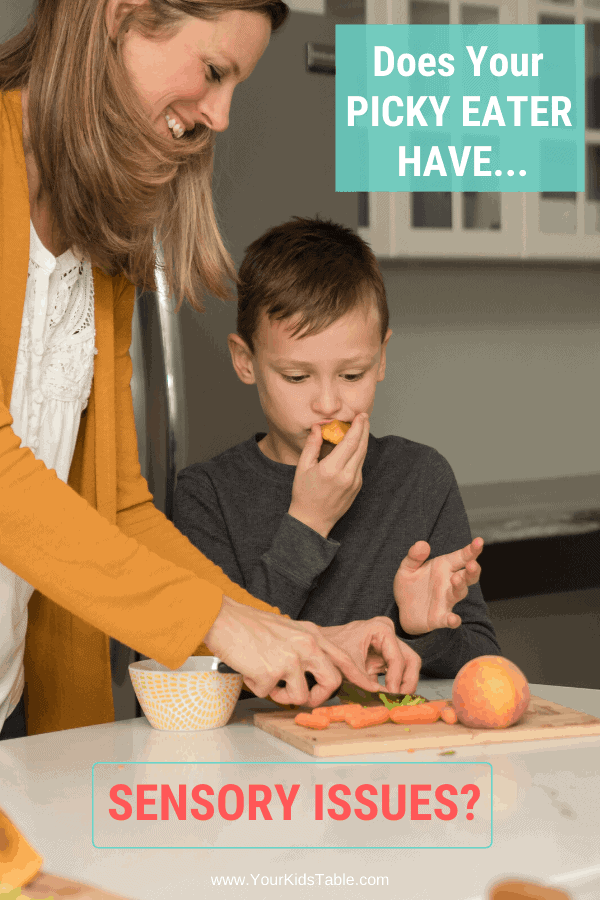Many picky eaters are selective about textures because of their sensory processing, but is sensory affecting other areas of their life? Find out if it is and what you can do today to help them…
Before she even started class, she told me, “I don’t think her picky eating has anything to do with sensory. She never complains about texture, she just doesn’t eat a lot.” Hmmm, I wasn’t convinced.
Not yet, anyhow.
Sensory, or to be more exact sensory processing, is complex and there are so many different ways it can present itself. It’s easy to miss signs that an occupational therapist like myself would catch.
Once Susan* got into Mealtime Works she soon realized there were signs that her daughter was having trouble with textures and that sensory was indeed a factor with her daughter’s eating. But, Susan couldn’t help but wonder if her daughter’s sensory issues, or as I like to say, sensory differences, stopped at her eating.
Now that sensory was on her radar, she started to notice other things her daughter was doing as potentially related to her sensory processing. Things she would’ve never thought about before.
So the question is, with so many kids having sensory issues that play a role in picky eating, do those same kids have more sensory issues that affect other areas of their life?
*Name and minor details changed for privacy
Wait, What Does Sensory Mean?
In case sensory is a totally new topic for you, which it is for many, let’s go over a quick definition:
Sensory, or sensory processing, is our brain interpreting (or thinking about) all the sensations we experience and creating a response.
A response can be anything from noticing any particular sensation to completely ignoring it. When sensory processing is working well, the brain quickly sorts through all the sensations with a good balance of what sensations need to be ignored, like the way the chair feels under your butt while you sit on it, and which one’s we need to pay attention to, like the bee that is buzzing by your ear.
Read more about sensory processing here.
What Picky Eating Sensory Issues Look Like…
Eating in general is a sensory experience. When you eat, you look at, smell, touch, taste, and feel the food in your mouth. It might even make noises. As you chew and swallow your food, you feel all those sensations because of your sensory processing, even though you’re hardly paying any attention to them.
That’s why it’s extremely common for there to be a sensory link for picky eaters. If a child is particular about the type of textures they eat, it’s likely because other textures don’t feel good or are even uncomfortable to touch or have in their mouth, to the point of gagging.
Gagging at the sight, touch, or small taste of food is a huge sign that your child is over-processing those sensations. This shows up as extreme sensitivity. Some other sensory signs related to picky eating you could see are:
- Getting upset when their hands get messy eating
- Refusing to touch certain textures of food
- Over stuffing food into their mouth
- Holding or pocketing food in their mouth for long periods of time
- Only eating one texture of food like crunchy, but some kids prefer soft
- Complaining of smells often
- Not noticing any smells at all
- Refusing to look at foods
- Only eats one flavor of food like extremely bland or spicy/strong/tart
To learn how to help your child improve their sensory processing for eating, head over to Sensory Issues with Food.
Can a Child Only Have Sensory Issues Related to Picky Eating?
Maybe you’ve been aware of this sensory connection to your child’s picky eating? And you’re shaking your head yes as you scroll the list above.
Are you wondering if the sensory issues or differences stop there? Is that usually the case?
The answer is that some kids do seem to have isolated sensory issues related primarily to eating. But, in my experience, this is the minority of picky eaters. What’s more often the case is that some other aspects of their life are also being affected by their sensory processing.
To what extent varies widely.
One kid may be an extremely picky eater because of sensory and also have difficulty getting messy while they’re playing or tolerating tooth brushing.
For another child, once a family knows and understands what sensory is they start to see all sorts of signs that suddenly explain why they have difficulty following directions, playing with peers, and learning at school because sensory can have a colossal impact on all of those things.

How to Know if There’s Other Sensory Issues Going On With Your Child
Remember Susan? Well, she started to notice that her daughter was scared of some types of movement. She was scared to ride the swing without her parents nearby and when her daughter got on a topsy-turvy chair that left her feet dangling off the ground, she got very upset, despite really wanting to ride the chair like the other kids.
The first step to knowing if there’s other sensory issues going with your child is simple:
Step #1: Start thinking about the odd, quirky, or frustrating things your child does.
When Susan didn’t know about sensory, she thought her daughter was just a little scared of heights. But, once she knew about sensory, she saw the situation in a whole different light, even though she didn’t fully understand why or what was bothering her daughter.
Being open and aware from here on out will allow you to see things that you missed before too.
Step #2: Think through the senses.
There’s actually 7 of them, not just 5. Vestibular is our sense of movement. It keep us from getting dizzy when we walk across the room. And this is the sense that was affecting Susan’s daughter.
Proprioception is our sense of body awareness. It sounds strange because it’s something we totally take for granted.

Signs of Sensory Issues Across the Senses
If you like printables, you can grab this list of 21 Sensory Red Flags that parents often miss, it covers all the senses.
However, it’s really helpful to see a few of the most classic signs for each of the senses, there’s a wide range for each sense. Your child could have none, some, or many of the signs. Once you’re aware of them, it’ll open you up to seeing the sensory processing difficulty signs in your child:
Seeing (Vision)
- Loves bright and/or flashing lights
- Hates bright and/or flashing lights
- Stares at moving objects
- Finds contrasting colors and shapes
- Likes bright colored, fast moving TV shows
- Doesn’t always respond to name being called, even though hearing is fine
- Gets very upset at loud or sudden noises
- Talks extremely loud
- Makes a lot of noises
- Can’t stand finger painting
- Doesn’t like walking barefoot in the grass
- Hates getting hair scrubbed during washing or soap on face
- Touches everything
- Can’t get enough mess, finger paints their whole body
- Gets upset when they smell food cooking
- Frequently smells all sorts of unusual things in their environment
- Puts toys, pencils, and all sorts of other objects in their mouth
- Licks seemingly random objects in their environment
Body Awareness (Proprioception)
- Loves to climb, jump, and/or hang
- Seeks out roughhousing and wrestling
- Bumps into things all the time, appears clumsy
Movement (Vestibular)
- Scared to ride a bike, get on a swing, or climb
- Doesn’t like things that spin
- Loves spinning
- Loves hanging upside down
What Should I Do If My Child Has Sensory Issues?
Many kids and adults have sensory differences and they’re manageable. Being aware of sensitivities or a need for sensations can be easily incorporated into your child’s life with what’s called a sensory diet, which can be very simple.
If you feel like your child has a lot of sensory issues or differences, they may benefit from Sensory Integration Therapy as well. Either way, your child will thrive with a simple sensory diet you can implement in your home too.
If you have a question about your child’s sensory differences, ask it in the comments below.
More on Sensory Processing
Sensory Processing Difficulties in Kids
What If Your Kid Isn’t Listening Because of Auditory Processing Difficulties?
7 Awesome Sensory Activities Using a Yoga Ball
Alisha Grogan is a licensed occupational therapist and founder of Your Kid’s Table. She has over 15 years experience with expertise in sensory processing and feeding development in babies, toddlers, and children. Alisha also has 3 boys of her own at home. Learn more about her here.

Hi, I have to say I wish my parents read this article 39 years ago. I definitely have sensory issues, and it has impacted many things in my life from what I eat everyday, avoiding certain people, choosing hobbies and career. More importantly, I have a baby about to turn 8 months old and she won’t swallow foods. She drinks milk from the bottle, but never learned to transfer milk from the breast. We have tried many types of foods over 6 weeks. She has a couple of favorites, but barely swallows even her favorites (oatmeal with breast milk and pureed chicken). Fruits seem to bother her most. She holds food in her mouth and slowly oozes it out over time. After a couple of minutes of even her favorite foods, she turns away and won’t look at it any more. Where do I start to help her?
Hi Nick,
We’re so glad you’re here! Picky eating and sensory challenges often go together! A great place to start would be with our free workshop about transitioning to table foods. You can save your seat HERE. We also have a post that gives you an ideal of a possible feeding routine for an 8 month old. That might be helpful as well! Let us know if you have any questions!
Best,
Andrea
Hi there,
Thanks so much for all your informative content!
If it’s ok I’d like to give some info on my son and ask if you would consider that he might benefit from a sensory diet? I don’t feel sensory integration therapy is needed but would appreciate your view.
My toddler, just 2 months over 2 years old, has become quite picky with his food since he turned 1 or somewhere around that age. He used to eat everything, curries with different textures, different flavours etc but is much more picky and seems to not like mixed dishes with lots of different textures etc.
I’m trying to follow advice from your info on still offering him some of these foods when I/my family are having them with a side of something he’s likely to definitely eat. He has tried some a few times but I find it very hard not to be concerned when he regularly refuses to have any and is therefore having a much less well rounded meal. I also sometimes will tell him that he can have whatever he’s asking for that’s not part of that meal like a sweet thing (healthy homemade things/ dried fruit/fruit etc) when he eats some of the meal in front of him first.
He doesn’t like swings in the playground and the bouncy see-saw with his feet off the ground and for a long time would only go down the slide on his front after an experience of his foot slightly sticking to the slide. He also runs away from other kids almost in a panic in the playground quite a lot if which is concerning from me…This may partly be due to having had a bump into an older child before which I think he remembers and fears. (Due to Covid he hasn’t been able to attend playgroups in person).
At times he gets very stressed over his clothes not sitting right or hoods etc near his neck.
He has recently started asking me regularly ‘what’s that noise?’ when there’s no obvious noises other than the humming of the fridge or the clock ticking so it seems he’s very aware of the sounds around him.
He has tried finger painting and was not a fan. He just wanted the paint off of his hands. If his fingers get messy with food he sometimes just licks it off and other times will get stressed and just want it off.
Apologies for the length of this. I just wanted to give as comprehensive a picture as I could.
Thanks so much for your time!
Warmest Regards
Rachael
Hey Rachael,
Thanks so much for reaching out to us. We know all to well how hard all of this is to navigate. It does sound like there are some sensory differences that he is having. As well as in regards to the picky eating. Sensory diets can be helpful, but I’d look at what specific activities are affecting him the most to try to work on those and work your way up from there. In regards to the picky eating, we do have a free workshop that is a great place to start. You can save your seat here
Best,
Desiree
Thanks Desiree. I really appreciate that.
I’ll get onto the workshop and look for information on solutions to his individual sensory needs
My four year old son is extremely picky when it comes to food! Also has troubles with pooping in the toilet! Terrified when the wind blows. I always thought he would grow out of it because I am a young mom and he is an only child but now I am seeing it is not normal. Should I make an appointment?
Hey Deanna,
You can always feel free to reach out for an appointment even if it’s just an evaluation so you can get some input into what your child is doing. Understanding his sensory needs/differences will help you be able to provide activities throughout the day to help him flourish. If your new to sensory, we do have a free workshop that helps understanding! You can save your seat HERE
Best,
Desiree
My 6 year old niece doesn’t eat any food, she will only drink vanilla flavoured drinks out of a specific bottle, we can’t get her to open her mouth to brush her teeth or even to get a look in her mouth, she likes to lick objects, specifically her tablet, which by the way, she can navigate through with no issues. Currently her father is waiting on therapy for her. Can she live on liquids alone, she drinks meal supplement shakes?
I have enjoyed and benefited a great deal from your compassion to give our children the very best for their lives.
I am a grandmother of a precious boy, age 11. I have searched and been referred to many therapists and the have a limited schedule.
I will open workshops and know that his mother and I will benefit.
You are a blessed young woman
Grateful for your experience.
Antoinette (Toni) Nicolaou
Antoinette,
Thank you so much for your kind words! So glad you are enjoying and benefiting from our information! Please don’t hesitate to reach out if you have any questions!
Best,
Desiree
How do i know if my 1 y old has sensory issues. She seems to me not liking soft food if i feed her but she is ok touching it and feeding herself like yogurt. Am I overthinking it.
Hey Rania,
In the article I’d download the list of 21 Sensory Red Flags! This will help you see if there are any signs of Sensory!
Best,
Desiree